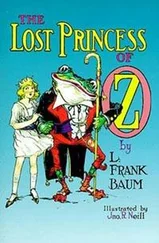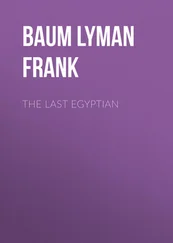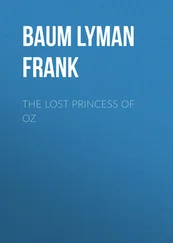L. Baum - The Last Egyptian
Здесь есть возможность читать онлайн «L. Baum - The Last Egyptian» весь текст электронной книги совершенно бесплатно (целиком полную версию без сокращений). В некоторых случаях можно слушать аудио, скачать через торрент в формате fb2 и присутствует краткое содержание. Год выпуска: 2019, Издательство: epubBooks Classics, Жанр: Прочие приключения, на английском языке. Описание произведения, (предисловие) а так же отзывы посетителей доступны на портале библиотеки ЛибКат.
- Название:The Last Egyptian
- Автор:
- Издательство:epubBooks Classics
- Жанр:
- Год:2019
- ISBN:нет данных
- Рейтинг книги:4 / 5. Голосов: 1
-
Избранное:Добавить в избранное
- Отзывы:
-
Ваша оценка:
- 80
- 1
- 2
- 3
- 4
- 5
The Last Egyptian: краткое содержание, описание и аннотация
Предлагаем к чтению аннотацию, описание, краткое содержание или предисловие (зависит от того, что написал сам автор книги «The Last Egyptian»). Если вы не нашли необходимую информацию о книге — напишите в комментариях, мы постараемся отыскать её.
The Last Egyptian — читать онлайн бесплатно полную книгу (весь текст) целиком
Ниже представлен текст книги, разбитый по страницам. Система сохранения места последней прочитанной страницы, позволяет с удобством читать онлайн бесплатно книгу «The Last Egyptian», без необходимости каждый раз заново искать на чём Вы остановились. Поставьте закладку, и сможете в любой момент перейти на страницу, на которой закончили чтение.
Интервал:
Закладка:
All this indicated suddenly acquired wealth—that mysterious old Hatatcha must have left to her grandson much more than the papyrus rolls; and although Kāra might endeavor to be secret and uncommunicative, he was bound to betray himself before very long. Now was the heated term, and even gay Cairo was listless and enervated. The dragoman would have ample leisure to pick this bone skilfully before the tourist season arrived.
Kāra’s first angry exclamation was followed by a word of greeting. He was glad Tadros had found him, for as yet he had secured no place of residence, and the bigness of the city somewhat bewildered him in spite of his assumed reserve.
The dragoman agreed to take him to a respectable rooming–house much frequented by Copts of the better class. When they had arrived there, Kāra’s guide made a mystic sign to the proprietor, who promptly charged his new guest double the usual rate, and obtained it because the Egyptian was unaware he was being robbed. The room assigned him was a simply furnished, box–like affair; yet Kāra had never before occupied an apartment so luxurious. He examined the door with care and was pleased to find that it was supplied with a stout bolt as well as a lock and key.
“Now,” said the dragoman, “it is yet early; we have barely crossed the edge of the evening. I will take you to the theatre to see the dancing girls, and later to a house where they wager money upon a singular and interesting game of red and black. We can afterward eat our supper at a restaurant and listen to a fine band composed of Hungarian gypsies. How will that suit you?”
“Not at all,” replied Kāra, coldly. “I am going to bed. Be here to receive my orders at seven o’clock in the morning.”
Tadros fairly gasped with astonishment.
“Seven o’clock is too early,” he said, a little sullenly. “The city is asleep at that hour.”
“When does it awaken?”
“Well, the shops are open at about nine.”
“Come to me, then, at nine. Good night.”
This summary dismissal was a severe disappointment to the dragoman, yet he had no alternative but to take his leave. Strange that Kāra had refused the dancing girls and the game table; but perhaps he was really tired. Tadros must not expect too much from his innocent at first.
At nine o’clock the next morning he found that the young Egyptian had breakfasted and was impatiently awaiting him.
“Take me to the leading jeweler in town,” said Kāra.
The dragoman frowned, but presently brightened again and took his employer to a second–rate shop, where his commissions were assured.
“Not here,” said Kāra. “I have seen much better shops.”
Tadros tried again, but with no better success; so he altered his plans and took Kāra direct to Andalaft’s, trusting to luck to exact a commission afterward.
“Now, then,” said he, briskly, “what shall we examine first?”
But Kāra ignored him, asking to see the proprietor in private. Mr. Andalaft graciously consented to the interview, and when the Egyptian entered the great jeweler’s private room Tadros was left outside.
Kāra laid a splendid ruby upon the merchant’s table. The latter pounced upon it with an eager exclamation.
“It is very old,” said the Egyptian. “Tell me, sir, is there any one in Cairo who can recut it in the modern fashion?”
“But it will be a shame to alter this exquisite gem,” protested Andalaft. “It is the square, flat cutting of the ancients, and shows the stone to be absolutely pure and flawless. Such specimens are rare in these days. Let it alone.”
Kāra shook his head with positiveness.
“I must have it recut,” said he, “and by the best man obtainable.”
“Ah, that is Van der Veen, the Hollander. He does all my important work. But Van der Veen will himself argue against the desecration. He is a man of judgment.”
“Where can I find him?” asked the prince.
The merchant reflected.
“I will give you a letter to him,” said he. “If the stone must be recut, I want Van der Veen to do it himself. He has three sons who are all expert workmen, but no one in the world can excel the father.”
He wrote the note, addressed it, and gave it to Kāra. Then he again picked up the ruby and examined it.
“If you would but sell it,” he suggested, with hesitation, “I could secure for you a liberal price. The Khedive has placed with me an order for a necklace of the ancient Egyptian gems; but in two years I have been unable to secure more than three stones, none of which compare with this in size or beauty. Allow me.”
He opened a drawer and displayed the three antique stones—two emeralds and an amethyst. Kāra smiled, and putting his hand in a pocket underneath his burnous, he drew out five more rubies, but little inferior in size to the one he had first shown.
“Tell me,” said he, “what price you will pay for these, to add to the Khedive’s necklace.”
Andalaft was amazed, but concealed his joy and eagerness as much as possible. Carefully he examined the gems under a glass and then weighed each one in his scales.
“I will give you,” said he, after figuring a little, “four hundred pounds for the five stones.”
Kāra shrugged his shoulders and picked up the rubies.
“That may be the price for ordinary gems,” he remarked; “but their age and cutting give these an added value. I am holding them at eight hundred pounds.”
The merchant smiled.
“It is easy to understand,” said he, with politeness, “that you are a connoisseur of precious stones; but, because you love the antique, your partiality induces you to place an undue value upon your rubies. Come! let us say six hundred.”
“I will not bargain,” returned the Egyptian; “nor do I urge you to buy. If you cannot afford to pay my price I will keep the rubies,” and he made a motion to gather them up.
“Stay!” exclaimed the jeweler. “What does it matter? The Khedive wishes them, and I must make the sacrifice for his pleasure.”
With a hand he vainly endeavored to render steady he wrote a check for the sum demanded, and Kāra took it and went away. Andalaft had made an excellent bargain; yet the Egyptian, for all his cleverness, did not know that he had been victimized.
At the house of the diamond–cutter, on a quiet side street at the lower end of the Mouski, Kāra had a long interview with Van der Veen and his three sons. As a result they agreed, after examining the magnificent diamonds shown them, to devote their exclusive services to Prince Kāra for a full year, he promising to keep them busy with the work of recutting his collection of ancient gems.
Afterward he sent Tadros with notes to Gerald Winston and the banker, informing them of his temporary address, as he had promised. Then he had an excellent luncheon and smoked a Cuban cigar. In the afternoon he followed his imploring dragoman into several shops where he made simple purchases, and returned early to his hotel to find Winston impatiently awaiting him.
“You must accompany me at once to see my friend Professor Daressy, with whom I am already disputing concerning the new papyri. He is much interested in your method of interpreting the manuscripts, but requires a better proof of its accuracy than I can give him. Will you come?”
“It will give me pleasure,” answered Kāra—he drove with Winston to the curator’s house. His knowledge of the hieroglyphics was well founded, and he was not averse to an argument with the two savants. Indeed, they found his explanations so clear and concise that they were equally amazed and delighted.
The Egyptian dined with them in a private room, where the discussion could not be interrupted, and it was late in the evening when he returned thoughtfully to his own humble lodging.
Читать дальшеИнтервал:
Закладка:
Похожие книги на «The Last Egyptian»
Представляем Вашему вниманию похожие книги на «The Last Egyptian» списком для выбора. Мы отобрали схожую по названию и смыслу литературу в надежде предоставить читателям больше вариантов отыскать новые, интересные, ещё непрочитанные произведения.
Обсуждение, отзывы о книге «The Last Egyptian» и просто собственные мнения читателей. Оставьте ваши комментарии, напишите, что Вы думаете о произведении, его смысле или главных героях. Укажите что конкретно понравилось, а что нет, и почему Вы так считаете.












